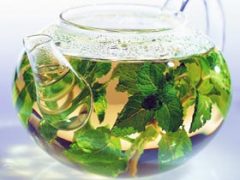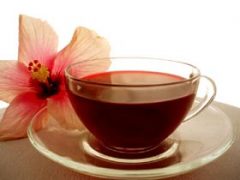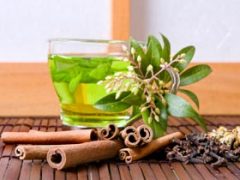 Modernized diets have made high cholesterol one of the most common health hazards in the United States. While the body relies on cholesterol for a great many physiological processes, too much can be detrimental to health, leading to the buildup of arterial plaques that can contribute to heart conditions and even sudden death. High cholesterol medications, as an unsurprising result, are some of the most frequently prescribed medicines on the market, with their sales reaching staggering digits. To battle cholesterol at home however in conjunction with lifestyle changes, many people look to tea for high cholesterol as a natural remedy for artery clogging lipids. That’s right, tea; whether a single type of tea, or one of many herbal tea recipes using a variety of herbs, tea can be a delicious way to shift the HDL / LDL balance.
Modernized diets have made high cholesterol one of the most common health hazards in the United States. While the body relies on cholesterol for a great many physiological processes, too much can be detrimental to health, leading to the buildup of arterial plaques that can contribute to heart conditions and even sudden death. High cholesterol medications, as an unsurprising result, are some of the most frequently prescribed medicines on the market, with their sales reaching staggering digits. To battle cholesterol at home however in conjunction with lifestyle changes, many people look to tea for high cholesterol as a natural remedy for artery clogging lipids. That’s right, tea; whether a single type of tea, or one of many herbal tea recipes using a variety of herbs, tea can be a delicious way to shift the HDL / LDL balance.
Basic black and popular green tea are both known for their abilities to reduce cholesterol numbers. This ability is attributed to catchecins that both black and unfermented green tea contain. These antioxidants provide many other body benefits as well, fighting off free radicals that can promote illness. Green tea, which features the least amount of fermentation and hence a higher proportion of catchecins is a better tea for high cholesterol than standard black tea. The more fermented the leaves are, the less of the powerful compounds they are likely to contain. Level of fermentation also affects caffeine content, with both increasing simultaneously.
Green tea for high cholesterol has been discussed at length recently because it has been shown to have an ability to get some people out of higher risk zones in terms of heart health and cholesterol levels. However, to have any sort of impact, a lot of green tea needs to be consumed (as much as ten or more cups daily). While its effects are noticeable and documented, this can be a rather large undertaking for people that are already in danger zones in terms of their lipid levels. Hence tea for high cholesterol is better used as a preventative tool than for management. Green tea is also popular in herbal blends and recipes.
In terms of herbal tea for high cholesterol, nature provides many lipid lowering options. High in vitamin C, hibiscus flower (also called sorrel) has been used to reduce high levels of cholesterol. In addition, the dried leaves have also been attributed to reducing blood pressure, a welcome side effect for those concerned about cardiovascular health. Unsurprisingly, some herbal tea recipes that use hibiscus flower also include hawthorn berry, another heart helping herb. Used widely in berry and even peach flavored herbal teas, Hawthorn is thought to help the heart by relaxing blood vessels and hence aiding in circulation. These benefits are attributed to substances contained therein that are similar to flavonoids, compounds with a known wide range of health benefits.
Because of the immense collection of herbs that are thought to benefit the heart, recipe blends that include several herbs are incredibly popular which provides variety in taste and function. For instance, a tea for high cholesterol may also contain herbs that promote circulation and good vein health along with blood pressure reduction. This way, cardiovascular health is being addressed on numerous fronts with an emphasis on reducing bad cholesterol. Cassia seed is a popular component of these recipe blends because it both reduces cholesterol and blood pressure. Cassia based herbal teas are typically blended with licorice root, which is thought to reduce toxins in the blood to provide further benefit.
The battle for cholesterol ratio harmony does not just stop at reducing bad (LDL, or low density lipoprotein) cholesterol. There is also something to be said about naturally occurring herbs that can help boost good cholesterol too. Green tea again is popular in this regard, but could soon be overshadowed by sage. The lowly seasoning has performed well in small studies that show it may help lower total cholesterol and have positive effects on good cholesterol too, thanks again to antioxidants.
Diet can play an important role in the management and even treatment of certain health conditions. Cholesterol levels can be influenced by both food intake and lifestyle. Enjoying a cup of tea is an excellent way to reduce stress and promote relaxation. But, underneath all of that, if the right leaves and herbs are used in the initial brew, there may be a mind blowing amount of health benefits in that piping hot cup. A tea for high cholesterol may seem impossible, but study data and clinical results have shown time and time again that the cardiovascular system can definitely be labeled a tea drinker.





